Craig Blundell on drumming for Steven Wilson, technology, counting and more
From relative unknown to hot topic in the prog community
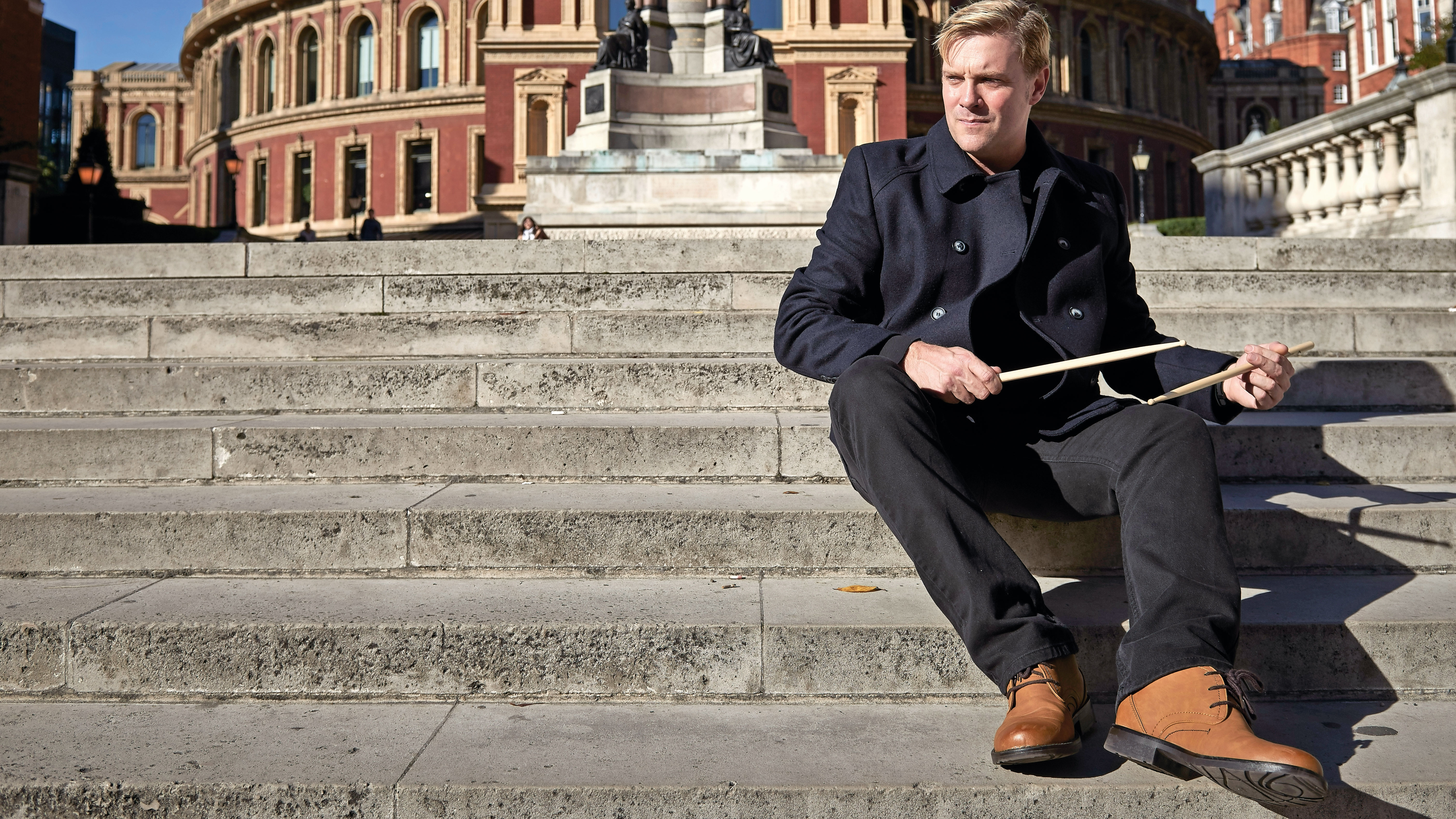
1 - Introduction
Progressive rock fans are some of the most loyal and discerning listeners in music. We’re sure fans of other genres of music will dispute that, but it would be a close debate.
The music and the musicians that create it become deeply meaningful and important to those fans and when bands change members or styles, it can be met with cautious scepticism. Such was the case with Steven Wilson’s recent solo project.
After helming Porcupine Tree with Gavin Harrison on drums for several years, that band went on hiatus and Steven released the well-received solo effort, The Raven That Refused To Sing.
Hand. Cannot. Erase.
While fans of the prog maestro had become accustomed to seeing Marco Minnemann, and more recently, Chad Wackerman, in the drummer’s chair on Steven’s solo tours, both of them were unavailable for the tour in support of Wilson’s latest release, Hand. Cannot. Erase. Enter Craig Blundell.
International fans may have scratched their heads due to lack of familiarity with his name, but those familiar with Blundell’s work nodded knowingly at Steven’s choice for the seat.
After playing in the drum corp for the military, he played kit in pick-up jams and pub bands while working whatever day gig he could to pay the rent. After a few attempts, Craig went pro in 2008 and began playing drums and music full time. A keen interest in electronics, triggering and loops led to a significant partnership with Roland, for whom he also does clinics.
Playing sessions, jingles and gigs here and there paid the bills but Craig’s true passion was progressive music. He played in studios and gigs whenever he could as he continued to hone his craft.
Winning over the prog crowd
Whilst he is known on the studio circuit amongst musicians and producers, the Wilson gig is Craig’s first high-profile exposure. It didn’t take long for the legions of prog fans to be won over. After stints in South America, the US and Europe, including two special gigs at the Albert Hall, Craig and the band have received rave reviews for their performances.
During the tour’s current down-time, in addition to accepting private students in person and via Skype, Craig is gearing up for another round of touring with Wilson throughout 2016.
He’s been busy in the studio as well, recording material with Steven and working on his second solo album. With all of that on his plate, Craig is also writing an instructional book. We caught up with prog’s busy rising star and talked with him about landing the Wilson gig, his passion for education and his goals of inspiring while entertaining.
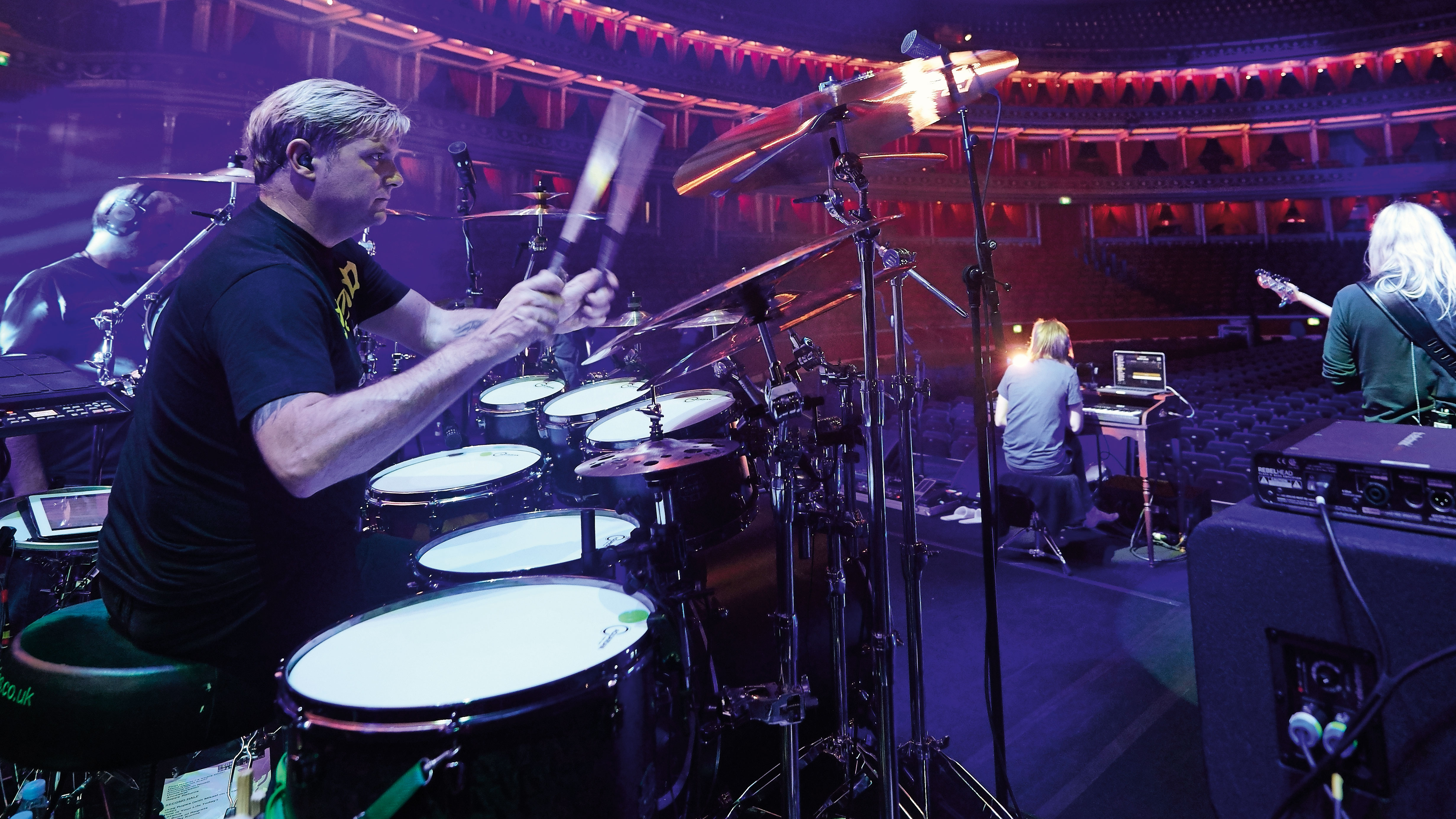
2 - Getting the gig
How did your name come into the mix when Steven Wilson was looking for a drummer?
“I was on holiday last Christmas and getting ready for doing another year of jingles, demos, clinics and a few gigs here and there. A friend of mine, John Mitchell, who’s a producer, sent me an SOS out of the blue saying, ‘Steven Wilson is interested in meeting up with you. He’s looking for a drummer. He’s auditioned some guys and he’s been looking at your stuff, are you interested?’
"I didn’t want to be a clone of Marco. I wanted to be me."
"I thought, ‘You’re kidding me, right? Why would he look at my stuff?’ He was deadly serious and said, ‘Can I hook you up?’ A day later, Steven Skyped me and said that John had said I’m the guy for him. He hadn’t heard of me, so he spoke to Gavin Harrison, and said, ‘Do you know this guy?’
"Gavin highly recommended me. We played on a couple of albums together, that’s it. We never really met. I find myself playing all the progressive stuff now. I’m a huge fan of Gavin, and he recommended me! Steven checked out my stuff and invited me to audition, which was really exciting.
"I went to audition, we played a track and a half, and he said, ‘Can you do the tour?’ I had other commitments, so I couldn’t do it. I was covering for Chad Wackerman on the Jennifer Batten tour. But, I’m like, ‘Man, it’s Steven Wilson, of course I want to do it! What an opportunity!’ Then, I found myself there, on the tour, which was really crazy!”
Once you got the gig, how did Steven guide you on the interpretation of his material?
“When Steven announced it, not all the fans were pleased. They wanted Gavin, they wanted whoever. They were, ‘Who is this guy?’ He sent me the set-list and some of the stuff that Marco [Minnemann, Steven’s drummer on the previous solo album and tour] had been playing on.
"Very quickly, I was like, ‘S**t, I need to practise! I need to really, really practise some stuff here.’ We had been Skyping and I was like, ‘Steven, I can’t even count it, what’s going on here?’ He said to me, ‘Your interpretation is key.’
"He’s had Gavin, Marco and Chad [Wackerman]. He likes drummers that are, he calls them ‘lead drummers’. He wants the drummer to lead. I’ve never been used to that. I’m quite shy outside the drumset.
"He wants me to play on turnarounds and things the fans will expect. Everything outside of that, it’s my interpretation. On Marco’s crazy stuff, I’m not going to insult Marco and myself by trying that. What I’m going to do is my own thing. Whether it be more music and chops, or less, that’s what he wanted.
"I didn’t want to be a clone of Marco. I wanted to be me. It took a while for that to happen. I found it very difficult for the first month with the nerves and the expectation. The fan-base is crazy, in a good way. Gradually I found my parts. I broke more cymbals than I’ve ever broken, which horrified me! Probably at around four weeks I was very happy. We only had two days of rehearsal. I didn’t get that much prep time unfortunately.”
"I’m a fan of writing things out in colours. Green for the easy stuff, red for the difficult."
How did you prepare for such a demanding gig with limited time?
“I set aside three weeks. Steven sent me the stuff with and without drums. I like to compose my own parts and see if it fits musically and mentally. I don’t want to force it on a gig.
"I didn’t really play the material until a day before rehearsals. The rehearsal was on Saturday and Sunday and we flew to Chile on Monday. The hotel room and practice pad are not the same thing.
"I was underprepared to be honest! I got to rehearsals, I was a nervous wreck. It was okay, we got away with it! Gradually, I started to get better and into it. I cheat-sheeted everything.
"Some of the songs are 15 minutes long. As the tour has progressed, he’s testing the band and pulling more stuff out. At the Royal Albert Hall, we had two completely different sets.
"I’m a fan of writing things out in colours. Green for the easy stuff, red for the difficult. I can glance over and look at the red and think, ‘S**t, here it comes!’ I have an iPad besides me, just in case.
"I’ve got Sibelius and all of these wonderful things people have sent me over the years. I’m still a fan of pen and paper. I find in my head, I can visualise it more. If I have a piece of music that’s eight or nine minutes long and I’m thinking about it now, if I’m looking at the middle-eight in Sibelius, it looks the same.
"But if I have a big red circle around it, I can see it. So, I write all my charts out on paper, take a photo and put it as documents and just swipe. Really old school.”
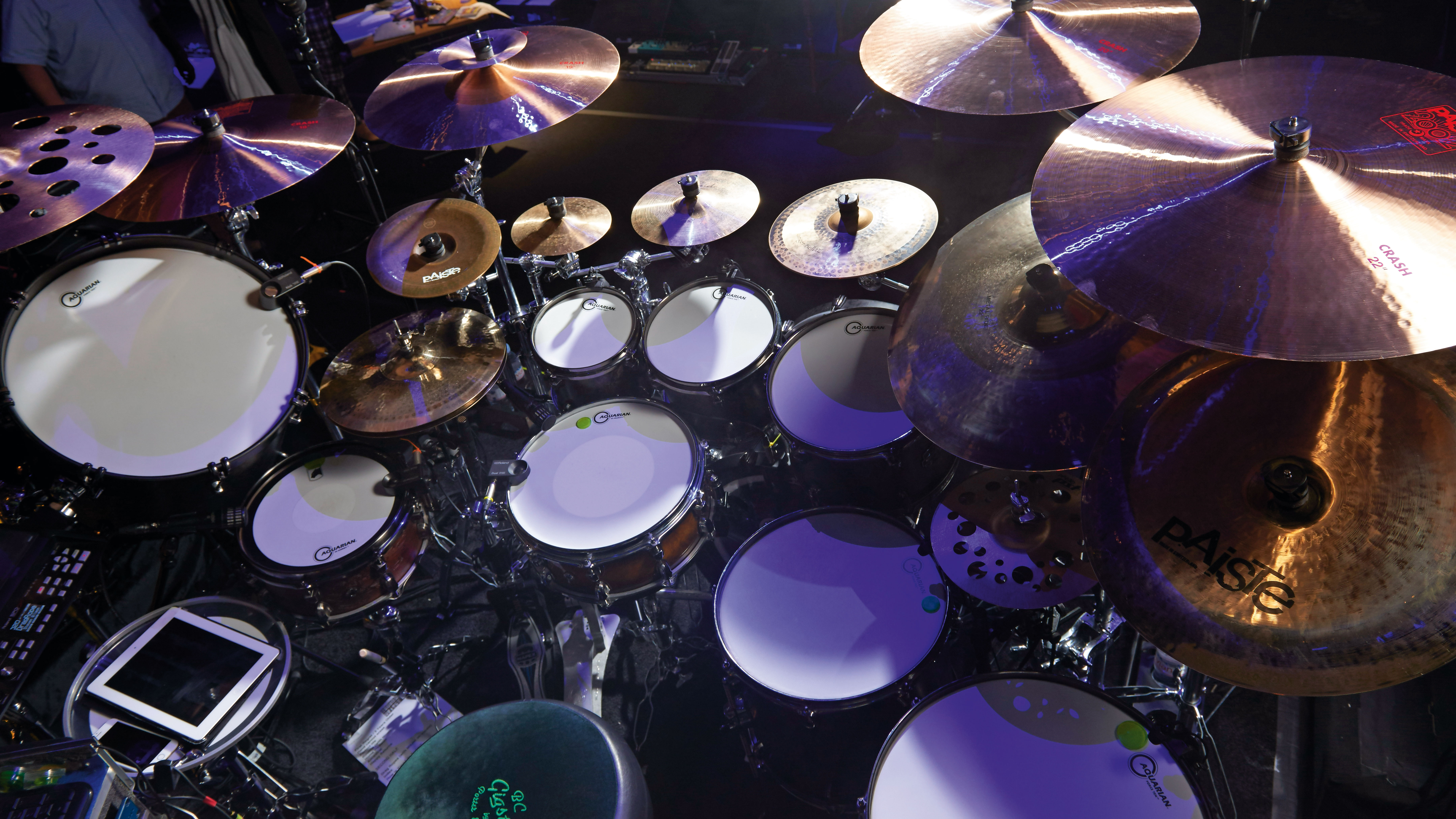
3 - Hitting harder, technophilia and Wilson studio time
Did you transition your style to be more aggressive and hard-hitting as per Steven’s request?
“Steven likes a big sound. Gavin and Marco have a huge sound. I’ve always kept everything kind of low. Steven records the show every night and listens back and will make a few changes or say things.
"I’d get up the next day and my body was wrecked. I feel like I’ve really done a workout here."
"Although he likes the technical stuff, he likes things angry and fairly heavy. He wants me to play hard. I’m a 7A guy, so I don’t smash the hell out of it, you know?
"I found myself on gigs playing louder, but having to grip tighter. I’m getting sweaty as well. I tried drummer’s gloves but can’t do it. So grip tape seemed to work well. It took about a week. I was coming off stage really tired.
"I’d get up the next day and my body was wrecked. I feel like I’ve really done a workout here. It was taking my fitness one step further. One week later, it felt natural playing hard. All the grace notes are there.”
Have you had a chance to reflect on your tour experience and let it sink in?
“With Steven, I’ve noticed he’s attracting a young audience. You’ve got the old stalwarts there with their Yes and Crimson T-shirts and that’s brilliant, but you also have the next generation.
"More prog fans are very young and they’re into it. They get it."
"It’s a really exciting time and there are some great bands out there. It feels like it’s coming back, and bigger than ever. There’s a progressive rock chart here in the UK, on the BBC.
"It’s great these bands making music that they believe in are getting a bit of notice now. It’s a massive resurgence. I felt it when I went to the States, South America and all over Europe. Fans are very young and they’re into it. They get it. It really is fantastic.”
What is the recording project you recently finished with Steven?
“He’s doing an EP, which is launching in January. Marco plays on a couple of tracks that I think are from the Hand. Cannot. Erase. sessions.
"Chad played on one track which is amazing. Really beautiful, as Chad does. I played on three tracks. One is live, that we did at the Montreal Jazz Festival and the other two were in the studio.
"It’s great to work with him in the studio. Really inspiring. He knows what he wants, but is open to ideas as well. Because of my electronics background, he wanted me to do some programming.
"I recorded all the drums and he sent it back to me and I programmed all my electronics and weird stuff that he wanted. I’m so proud of that. It sounds really cool.”
"Technology has changed everything for me."
How did you get involved with electronics and programming?
“Back in the late ’80s I was brought up on progressive music so I listened to bands like Yes, Crimson, etc.
"I remember seeing Bill Bruford with his Simmons pads. I was in a band in ’93 playing lots of covers, disco stuff. I had this old kit that wasn’t cutting it. I thought maybe I should get some electronics.
"The drummer at the time had a Simmons kit so he let me use it. We took the transducers out of the Simmons and put them underneath the snare, creating triggers. It worked really well.
"We realised we could use the SDS-2000 brain with the transducers playing a hybrid kit, which led to a fascination with it.
"Then Roland came along. I got a TD3, I think it was. I saw them at a trade show and I was chatting with them and said, ‘Look, I love electronics, I would love to get to do some demonstrations.’
"I was so passionate about layering and technology and they gave me an opportunity which was amazing. I find myself now as one of the main Roland guys worldwide which is incredibly humbling. They’ve helped my profile no end.
"I get a lot of comments from people around the world that see my videos and dig it. I try to make it accessible and break it down. I was the guy reading the manual and going, ‘Ah, I get it!’ I want to share that with people. People are busy so they’re quite afraid of the manual.
"I like to spend more time and share my knowledge. That’s how the MySpace, Facebook and Twitter came along. I like interacting with people. It’s been pretty tough with a lot of the hardcore progressive fans, it’s taken a while to get them on-side, but it’s getting there.
"When I can, I interact. It’s quite a nice social hub I’ve got. I’ve noticed a steady increase since getting the gig, a lot more people are liking the page every day and getting involved.
"Technology has changed everything for me. When the phone rings, there’s always a different job to do, not necessarily on the acoustic drumset. I can do anything program-wise. I get a lot of work for that now and it was great to do it with Steven.”
What is it like working with Steven in the studio and live?
“It’s really scary [laughs]! Everyone wants to work with him. Everyone’s backstage. All of my heroes are at the gigs and they’re backstage!
“Steven is planning a visual production. He’s planning something that’s absolutely insane.”
"He’ll record every show, multi-track and he’ll listen back and give me pointers. He gave me pointers for about the first six or seven weeks. Now, it’s like, ‘Do your thing,’ which is high praise.
"The great thing about Steven is he misses absolutely nothing. If I’ve made a mistake, he’ll notice. Just before we go on stage he might say something. He’s quite humorous, and he’s really dry. He’s very funny. I think once he trusts you, you can do anything you like.
"We have a lot of fun together. There’s a real chemistry on stage with the band.”
Are there any plans for a DVD release of the recent shows?
“Steven is planning a visual production. That’s all I’m allowed to say right now. He’s planning something that’s absolutely insane.”
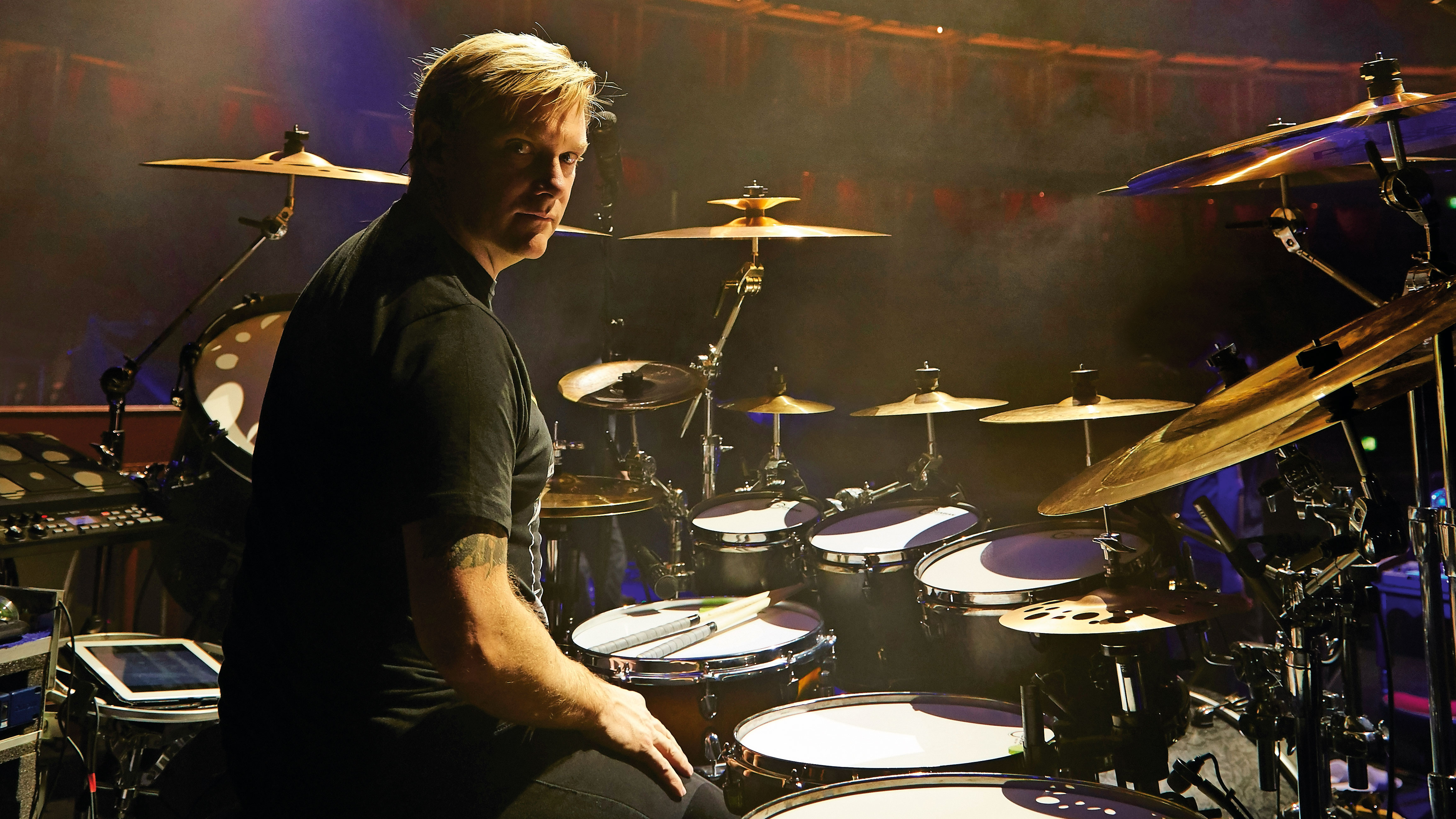
4 - Forces roots and smoothing odd numbers
What were you involved in before this gig?
“I turned pro in 2008. What people don’t know is when I was doing all the clinics and drum festivals, 2003-2008, I was still doing a day job.
"I played in a few bands, got a couple breaks, then it was back to the day job. When I turned pro, I had a couple of bands on the go.
"A year ago I was watching some Steven DVDs and thinking, ‘I’d love to be on that stage. Marco kills it. What an opportunity that would be.’"
"I might get lucky with a band called Frost*, who had Nick D’Virgilio and Andy Edwards in the past. I’m still with those guys. I’ve just recorded their new album. We don’t gig that often.
"I did some stuff with Pendragon, who are fantastic. An old classic British prog band. I’ve done some radio too.
"I’ve always been a freelance drummer. I’ve never had the opportunity to play in a band for any long period of time. I’m driven differently.
"The bands I’ve always played in over the years like the pub and club bands, they’ve always been set in their ways and I like to move on and progress. Three or four years ago when the bigger gigs started coming in prog land and the bigger progressive sessions came, I thought, ‘This is my calling. This is where I want to be.’
"A year ago I was watching some Steven DVDs and thinking, ‘I’d love to be on that stage. Marco kills it. What an opportunity that would be.’ So, it’s come full circle.”
What were your formative drumming years like?
“I started at the age of three. My parents couldn’t afford a drumset, so I was on the Tupperware, hitting everything as a kid. I remember seeing marching on TV and the drummers were raising their sticks to their nose and thinking, ‘I want to do some drum corps stuff.’
"I got in with my local Sea Cadets at age 11 and learned to play traditional grip, which felt really strange. My instructor was like, ‘You have got such a big future.’ I couldn’t read a note! I didn’t know what I was playing. I didn’t know what a paradiddle was.
"I went to a band contest and won the area finals and got through to the national finals and came in second. The natural progression was to join the Royal Marines. I joined at age 16.
"The natural progression was to join the Royal Marines. I joined at age 16. I didn’t join as a kit drummer, I joined as a snare drummer."
"I studied very hard on my hands. I didn’t join as a kit drummer, I joined as a snare drummer. I learned my hard corps chops for four years. I was still playing bits of kit, but not like the hardcore kit guys.
"I was on SDS drums learning all my chops and playing kit in local pubs and jazz bands on the weekend to keep my feet in. About four years in, my Captain told me, ‘Get out, get into some bands and play because you have a future.’
"I left the Marines and it dive-bombed completely! No gigs. I used to go to jam nights, I did a function band, I did all these things.”
Can you share any studio tips or valuable lessons you’ve learned?
“This big Canadian guy used to come watch me play. It turned out he was one of Genesis’ roadies. I didn’t know this at the time. He asked, ‘Would you do a session for us?’ I’d never done a session before. It turns out it was Mike Rutherford!
"I knew nothing about it. He was working on some demos for Celine Dion. I bombed on the session! I was nervous. I played too many fills because I was a young guy, eager to impress.
"That was the moment for me that I’m thinking, ‘Okay, I’ve got this really wrong.’ So, I went to see a guy named John Marshall, the drummer of Soft Machine. I studied a few jazz chops with him, and about playing for the song.
"I had a session with a band called Reflector, who had a record deal. Every time I listened back, I knew something wasn’t right, but I didn’t have the knowledge, know-how, or experience to fix it.
"But then one session with David Knopfler changed everything. He would say, ‘On that click, I need you to sit behind it ever so slightly.’ Nobody ever told me how to play with a click before.
"David was really inspiring. All of the album was ballads, simple stuff. I realised that I could play to a click and that maybe I could be a recording artist. But, I also thought maybe the simple, poppy stuff isn’t really for me.
"I love the pop guys. I’d do it, if need be. I don’t really have that discipline. It’s not where I get the most enjoyment.
"When it came to playing prog years later for a living, all those clicks in 15, 17 and 21 and all the modulations, it feels like seconds of the clock for me. That feels natural now. It’s taken 10 or 15 years of real hard work and metronome time constantly.”
What’s your approach to odd times and making them feel smooth?
“I had a real life lesson not so long ago listening to Ten Summoners Tales by Sting, listening to Vinnie. Young drummers tend to smash the ‘1’.
"You can be subtle and accent the ‘3’ or ‘4’. I was taught to make the time signature not so much like a block where you copy and paste – 7/8 or 7/4 should feel like 4/4. It should feel natural to the listener.
"If the time’s in 15, I won’t think in 15. I’ll think maybe a 3, 2 and a 10, or maybe 3 sets of 5."
"If I listen back on some stuff I’ve been recording recently, if it sounds like I’m clunking the ‘1’, I’ll go again. I’ll mess with the phrasings. I’m counting where ‘1’ is all the time, but sometimes if it’s a bar of 7/8, I might do a 9/8 and a 5/8 or 11/8 and a 3/8 turnaround.
"It makes for interesting programming, you know? I’m obsessed with numbers! If the time’s in 15, I won’t think in 15. I’ll think maybe a 3, 2 and a 10, or maybe 3 sets of 5. I may go outside the time signature and the next time I’ll take one off.
"I’ve got my set phrases, I’m just trying to make the numbers fit. There is a bit of mathematics around it, of course. The thing that John Marshall taught me, going back to learning with him, was not to put everything on that ‘1’.
"I think that’s where a lot of guys go wrong, when they shred all the chops and then, bam! You don’t have to. You can let it ride over and pick up the phrasing. Sometimes it’s more musical.
"I try not to smash the ‘1’ on every bar. People like Vinnie and Marco do it so well. They’re being musical with the time signature.”
Do you still work with the metronome in your practice routine?
“I can count the seconds of a minute fairly accurately. I can half it to 30, half it again to 15 or double up to 120 or 240. So, if I’m playing at 120, the click and my internal clock will be at 60bpm. I can double up, I can go twice as fast again. I just subdivide outside that.
"It’s quite weird and wacky, but I’ve got my internal clock programmed at 60. Once it goes in, then that’s it, it’s done.”
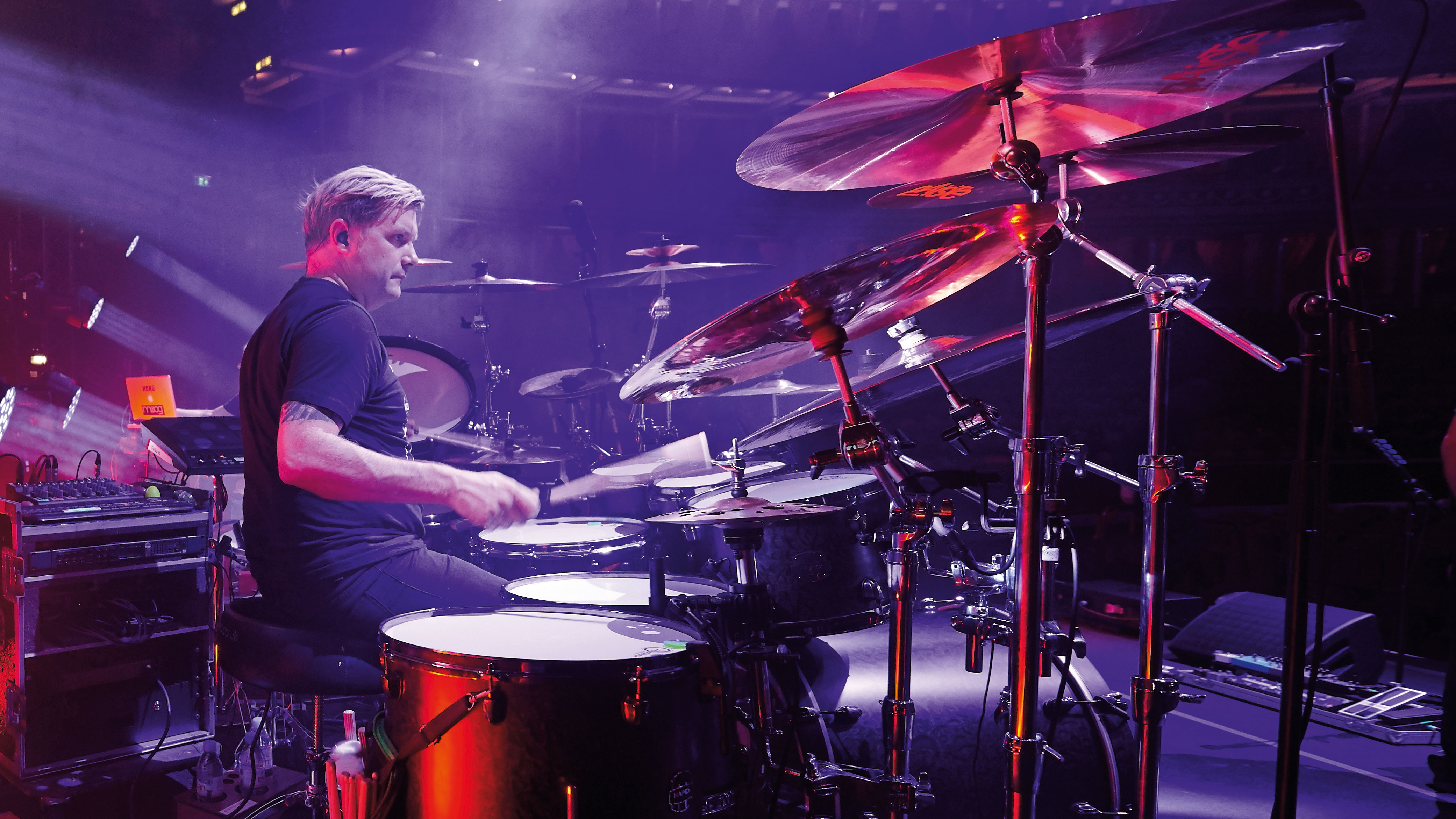
5 - No quick fixes
Who are some of the bands that have caught your ear lately?
“Two years ago, I saw Animals As Leaders. I thought, ‘That’s pretty cool!’ Matt Garstka is a great player. Opeth I think still push boundaries. They’re my two main ones recently that just blow me away.
"Between The Buried And Me are a very good band as well. There are some great bands out there that are just coming to the surface. For me, it started with Pink Floyd, Yes and Toto back in the day. Then, coming into today, Porcupine Tree. I’m a huge Toto fan, I would love that gig as well, but that’s another story!”
"I’ll only see some of my students four or five times a year. I’m not a fan of the quick fix."
You do a lot of private teaching, what is your approach with your students?
“I start with a blank canvas. When a student wants to come to me, I sit them down, make them a good cup of tea or coffee and ask, ‘What’s going on?’ I’ll get into their history.
"I’ll write down all the things they want to cover, all the things they’re struggling with. It’s normally based on people’s weaknesses. In my head, I’ve got thousands of lessons I’ve logged over the years.
"I will always set them on a three-month plan. I’m not a fan of having a lesson with me every week. The stuff I’m going to assign you is two or three months of hard work. I’ll only see some of my students four or five times a year. I’m not a fan of the quick fix.
"I want them to go away from the lesson feeling inspired, but knowing that they have a lot of work to do. I’m big on keeping a practice diary. I get them on a structured approach and a practice diary.
"I’ll write things based on their weaknesses and what they want to achieve. It works. I’ve got some great guys who have improved so much over the years.
"But, they’ve put the time in. I’ve turned away past students that don’t. It’s wasting their time and mine.”
You’ve released one solo album (Dr Oktopus), is there a release date for your second?
“No, there’s not. I’m still learning. My production values have changed. I’m blessed with a great studio. I’m going to get Steven’s stuff out of the way.
"Next year is a year of heavy touring. I’m still going to write on the road. At the moment, with Steven, that’s my priority. He wants me there, moving forward, which I’m more than happy to do. My own self-indulgent stuff can wait.”
What did you do when you suffered setbacks when trying to turn pro?
“From a young age, I realised my vocation. I always wanted to entertain and inspire people.Since being in the Royal Marines and teaching, I really enjoy and get a kick out of seeing people succeed and helping people achieve their goals.
“I turned pro the first time around 2003 and gave up the day job. I knew within two weeks it wasn’t going to work.
"Steadily, I started to get more work in pubs and clubs. Behind all that, I was chopping away. I wanted to be one of the best players in the world. I wanted to inspire people and get the big, progressive gigs.
"I wanted to do my own thing and talk about having a portfolio and being a musician, learning scales and harmony and being able to sing. Making the phone ring. My long term goal was, I wanted to inspire people.
"I felt like I had a message. That is still my same philosophy.”